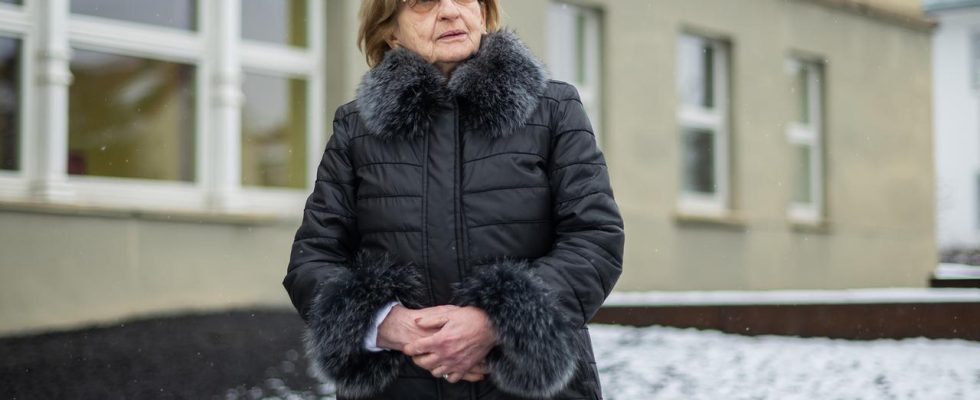Eva Szepesi survived Auschwitz. Today she is talking about it in the Bundestag. Sports journalist Marcel Reif will also speak there. He only learned his father’s story after his death.
Berlin A26877 – Eva Szepesi never forgets this number. It is the prisoner number from Auschwitz, tattooed on the left forearm. Eva Szepesi is 91 years old today. The number has faded but can still be seen. Szepesi is one of the few who can still tell about the hell of Auschwitz. She clearly remembers her last days there in January 1945. “I was like a skeleton. And they thought I was dead.”
Eva Szepesi was twelve years old at the time. In an interview with the SWR She tells how the death marches left the extermination camp. The Red Army is not far away. But she is too weak and remains lying among the dead. She still sees an image in her mind today: a Soviet soldier in a fur hat. “He smiled at me. And I opened my eyes. And it felt good.”
What Eva Szepesi didn’t know at the time: she wouldn’t see her mother, father and brother again. They were all murdered. The family comes from Hungary; it was not until November 1944 that Szepesi was deported to Auschwitz on one of the last transports. Alone – without mother, father and brother. She is the only one who survives.
“I told and told”
After the war, Eva Szepesi reluctantly goes to Germany, to the country of the perpetrators. She has children and starts her own family. But she doesn’t talk about what happened to her for 50 years.
Until 1995, when it was the fiftieth anniversary of the liberation of Auschwitz and she was invited to the memorial service. She hesitates and finally goes. “And it bubbled up. I told and told. At the end my two daughters gave me their arms. And said, this is the first time we’ve heard your story, Mom.”
Sports journalist Marcel Reif is also speaking in the Bundestag today.
One person who has never heard his father’s story is Marcel Reif. The well-known sports reporter doesn’t ask, “because I was afraid to hear things like what was done to my big, strong father.” Leon Reif, a Polish Jew, is kidnapped by the Nazis and rescued under fortunate circumstances. He then suffers from depression. But his son Marcel only finds out the reason for this after his father’s death.
He is grateful to him because he had such a happy youth and childhood, says Reif. “My father made sure that I, as a young man from the post-war economic miracle, could happily dance around the world, picking my nose. And that’s what he wanted.”
“Confront and don’t be silent”
Today it’s about telling stories. Reif and Szepesi speak in the Bundestag at the Holocaust memorial hour.
Marcel Reif initially felt overwhelmed. For he asked, How can he speak for his Father? Bundestag President Bärbel Bas convinced him to come anyway.
And Eva Szepesi now sees it as a duty to tell stories. In particular, she gives young people in one ARD-Documentation A clear message on the way: “If you experience or see injustice, to counter and not to mention. And always think alone.”
Both also meet young people who have come to Berlin. Conversations like these are important in order to carry forward the memories of contemporary witnesses – when soon there will be no one left who can tell the story first hand.
Anna Vollhardt from Mainz is 22 years old. She studies and works at the Anne Frank educational institution. She finds it very, very important that she meets a survivor like Eva Szepesi today. She says she is happy to still have the opportunity to do this. “Perhaps this will make it easier to pass this on to future generations.”
“Never again” as a fact
Marcel Reif says that he doesn’t need memorial days. But the country needs them, he says. He talks about the demonstrations that celebrated the Hamas terrorist attacks: anti-Semitism in Germany on the open streets. His father must have been spinning in his grave.
“‘Never again’ is not an appeal. It’s not a warning either. There’s far too much leeway in that for me,” said Reif. “‘Never again’ is a fact and nothing else – and it cannot be moved even an inch.”
The wish that it “never happens again” also drives Eva Szepesi. It should never happen again “that a mother is simply taken away from you. And a brother, a father. Because that hurts your whole life.” That’s exactly why she wants to tell the story while she still can.
Gabor Halasz, ARD Berlin, tagesschau, January 31, 2024 6:35 a.m

